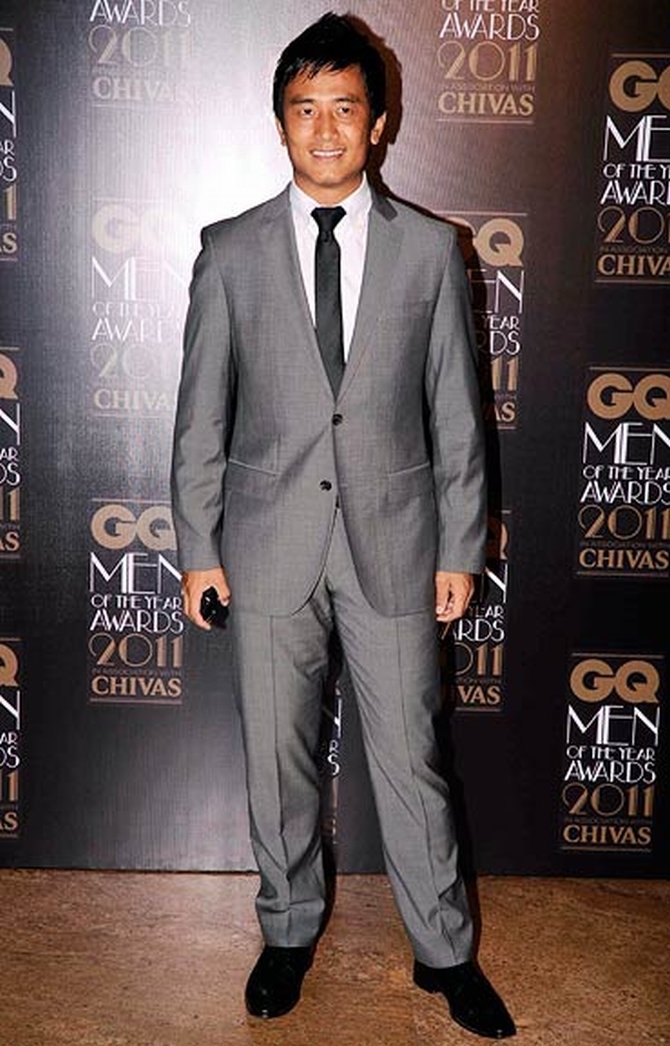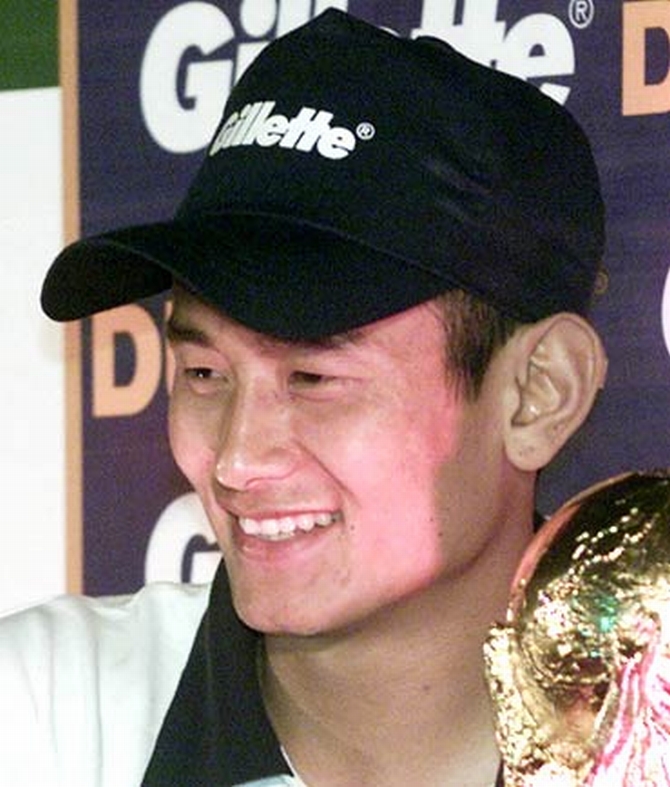
The former Indian football captain has a new target in the Lok Sabha seat of Darjeeling, but he may not find the going as easy as scoring a goal, says Joel Rai
The ornate gate constructed in Sikkimese style at the sandy ground gouged out from a hilltop overlooking Namchi town in South Sikkim bears the words “Baichung Bhutia Stadium”.
It is hardly a stadium, just a desultory wooden gallery that can seat around 500 people. The rest of the people who gather at the ground for football matches and political rallies watch the proceedings from the gentle slopes around it. But the locals take great pride in calling the “stadium” by their hero’s name, and umpteen people will tell you that it is the only one in India named after a footballer during his playing days.
Around 50 km from the playing arena, away from Bhutia’s home state, there is a similar sense of pride among a small band of political activists.
“Bhaichung is a boon to our prospects,” says NB Khawas, convenor of the Trinamool Congress in the hills of Darjeeling district.
Most people in the region tend to refer to Bhutia by his first name as a sign of affectionate kinship with the footballer.
Bhutia has been parachuted into Darjeeling by West Bengal Chief Minister Mamata Banerjee to wrest the Lok Sabha seat of Darjeeling from the grasp of the local powerhouse, the Gorkha Janmukti Morcha, which has, like in 2009, decided to support a Bharatiya Janata Party candidate.
“The youth are particularly happy to see Baichung as a candidate,” enthuses Khawas.
Indeed, Bhutia has always been an idol for the youngsters of Sikkim and Darjeeling.
Teenaged girls swoon over his native good looks and the boys see in him a role model -- someone like themselves from a lower middle-income family who made it big at a national level.
But they have always considered him a sporting hero, not a politician seeking their votes.
“Honestly, I was quite surprised when Mamata didi nominated me,” says Bhutia, “but now I am mentally prepared for the political fight.”
Bhutia, 37, has never before been seen in a political avatar, though he hasn’t entirely been a non-political person.
Indeed, in 2008, he raised quite a number of political eyebrows when he refused, as the country’s premier sportsman, to participate in the torch relay for the Beijing Olympics, citing support for the Tibetan freedom movement. But party politics?
“I have always followed politics and wanted to join active politics, only I wasn’t sure of the timing,” he says.
"Now when I see Mamata didi changing the face of politics in West Bengal, I feel it is the right time to take the plunge.”
Click on NEXT for more...

This wasn’t how his party initially saw it. The hill unit of the Trinamool Congress felt a local candidate would have been the best bet in the sprawling constituency. A delegation of the district unit even met party general secretary Mukul Roy and expressed reservations about Bhutia as a candidate.
Later, at Bhutia’s first press conference, when he declared that GJM president Bimal Gurung was his daju (elder brother) and sought his backing, the Trinamool district vice-president Rajen Tamang disrupted the meeting with shouts of “No, no, it’s not done, we have risked our lives to set up the party, we cannot take GJM’s support”.
Bhutia and North Bengal Development Minister Gautam Deb had to beat an embarrassing retreat from the media meet.
But Bhutia seems to have quickly learnt the ways of politicians.
Four days after the disastrous press conference, he declared to the media, “GJM was never a factor; we will win on our own.”
As a top footballer, Bhutia is used to dribbling past stout defenders who are not averse to a bit of gamesmanship in order to trip him in his stride. He will need these instinctive side-stepping skills if he is to go past the political obstacles in his path.
The Darjeeling Lok Sabha constituency has over 1.4 million voters spread across seven assembly segments, three of them in the hills and four in the plains. Political lines are sharply drawn between the hill voters who have been clamouring for the creation of a new state of Gorkhaland, and the plains electorate, to whom the issue isn’t of paramount interest.
In 2009, BJP’s Jaswant Singh won the seat by a margin of over two lakh votes on the back of GJM’s support.
People in the hills voted en bloc, with even anti-GJM parties asking their supporters to vote for BJP, saying it was a vote for Gorkhaland.
This consolidation of hill votes swayed the results, even though there were numerically more voters in the plains.
While even GJM insiders admit that this year the hill votes may not prove quite so decisive, Gorkhaland continues to raise passions, and Bhutia belongs to a party that doesn’t support the separation of Darjeeling and Dooars from West Bengal. This has led to a lot of people saying that the footballer, once their idol, has fallen from grace.
“His nomination is against the aspirations of the people in the hills,” says Harka Bahadur Chhetri, member of the West Bengal Legislative Assembly from Kalimpong. “In fact, it is an insult for Darjeeling that the chief minister should choose someone who is a zero in politics to fight elections here.”
Former chief minister of Sikkim Nar Bahadur Bhandari also told journalists, “Gorkhaland is the need of the hour for the people of Darjeeling. Any candidate without the agenda of the statehood cannot win the election. This has been proved in the previous elections.”
When you ask Bhutia how he hopes to gain support while ignoring the strong demand for Gorkhaland, he has his answer ready.
“The issue of separate statehood has been abused no end,” he begins. “We have to look at why the people have been demanding a new state. It is because the hills have been ignored and there has been no development. I am promising peace and development.”
He forgets that the people have made it clear that they are willing to forego development for what they call the “cause of national identity. The main resentment that has led to the demand for statehood is not development, but the fact that Gorkhas are described as foreigners and settlers from Nepal, ignoring the 200-year history of the community in India.
Click on NEXT for more...

“Statehood is the only way by which the polity and our fellow citizens will stop misconstruing our national identity as Indians,” says Enos Das Pradhan, president of the Bharatiya Gorkha Parisangh, an all-India social organisation involved in the statehood campaign.
And yet Bhutia continues, “I don’t even have to convince the people that a separate state is not the issue here, it is peace, harmony and development.”
It is statements like these that make people feel Bhutia, despite characterising himself as a son of the soil, has not really understood the sentiments of his electorate.
Worse, others see him as a pawn in the real politik of Banerjee.
“Mamata Banerjee is playing dirty casteist politics here,” says Chhetri.
He charges the Trinamool chief of “permanently disturbing” the relations between the hill communities of Gorkhas, Lepchas and Bhutias.
“She has fielded a Bhutia candidate now, having pried away the Lepchas from the Gorkhaland movement by constituting the Lepcha Development Council,” he says.
The newly minted politician shrugs off charges like these with a mere “people do not believe in such points, I am a person of the hills.”
He relies on his credentials as an India player for 16 years, 11 of them as captain. The faithfulness with which he approached his responsibility then, he promises, will also mark his responsibilities as a law maker.
He sounds confident, but anyone who has played 107 matches for India, the most by anyone, and scored 42 international goals would too.
Bhutia may be gung-ho, but he is up against a formidable GJM-BJP combine that has the veteran S S Ahluwalia as its candidate.
Then there is a popular independent candidate, Mahendra P Lama, former vice-chancellor of the Sikkim Central University.
The Trinamool Congress is a fledgling party in the hills and its anti-Gorkhaland stance may not win it too many votes, despite the general disenchantment with the GJM.
But in a scenario where it seems like two different elections are being held in the different geographical areas of the constituency, Bhutia may find himself at an advantage because his party is a strong force in the plains segments.
There, his main opponent will be the Communist Party of India - Marxist and its candidate Saman Pathak.
So, he may yet win the seat even if too many hill people do not press the button next to the three-leaf symbol.
That perception is perhaps why, with his characteristic sunny smile, Bhutia says, “I wore the number 15 jersey for India for 16 years. Now I will wear the No. 1 jersey.”
Click on NEXT for more...
Click on MORE to see another PHOTO feature...